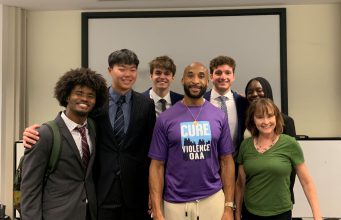As an investment banker and executive, Lado Gurgenidze made a name for himself with savvy business decisions and worldwide success.
As a television host, he shared knowledge and built a brand with a recognizable and authoritative persona.
As Prime Minister of Georgia, he continued massive economic reforms and led a country facing occupation by its neighbor.
His career has taken many paths, but passion for country, opportunity and a free-market society guided the former Emory student with each step. For those continuing efforts, Gurgenidze received the Sheth Distinguished International Alumni Award from the university on Nov. 15. He also spoke to several campus groups, including students at Goizueta Business School, where he received a Masters in Business Administration in 1993.
Gurgenidze once hosted the Georgian version of Donald Trump’s high-powered business reality show “The Apprentice” (“The Candidate”), and he showed the same calm, cool confidence in the face of many challenges – mostly political – in one year as his country’s prime minister.
He showed it again when discussing world economics with Emory students.
“It is through liberty that you unleash opportunity; equal opportunity, at least as equal as humanly possible, for the entire population,” Gurgenidze said, speaking to students about guiding principles that have made Georgia one of the top three places in the world to start a business. “Then you design a set of policies that help the poorest in the country, but helps them without taking their dignity away. That’s really what we’ve done…
“It’s through this course of economic liberty we’ve achieved opportunity for our people.”
His vision started at an early age.
Gurgenidze received his MBA at age 22 and began a successful career in investment banking in Europe but he returned to his native country in 2004 to lead Bank of Georgia and, in three years, grew the bank’s assets by 760 percent and its net income by 1,563 percent.
That made the bank a key player in the region.
Similar increases in return and status came with his time as prime minister.
In 2007 and 2008 the Georgian economy went through the final bits of major financial reform, making it more of a free-market state. Gurgenidze oversaw tax cuts, reform to the finance industry and other changes that took moved the country further from its past as part of the Soviet Union.
As a result, in many ways, Georgia continues to thrive in the face of world economic turmoil.
Gurgenidze was awarded the St. George’s Victory Order in 2008 – the highest civilian honor in his country – and he continues to speak on topics of economic reform in developing countries. He also co-chairs the Emory Center for Alternative Investments at Goizueta. He is currently Executive Chairman and CEO at Liberty Bank in Georgia, CEO of Liberty Capital and Chairman of the Supervisory Board at Bank of Kigali (Rwanda).
“Lado deserves a lot of the credit,” said Jeff Rosensweig, a Goizueta finance professor and director of the school’s global perspectives program. “Georgia is one of the few countries that has continued fast economic growth through this downturn.”
Gurgenidze points to simplicity in the Georgian tax and labor code as a reason for boisterous economic growth and hiring.
“The essentials are not that many: low, flat tax… One very simple tax structure,” he said. “We have no social insurance, payroll tax or anything so when an employer in Georgia hires and employee and they agree to a salary, that’s pretty much it; there’s no additional cost of employing an employee.”
For every year since 2005 more than 50,000 new businesses were created annually in Georgia, according to Gurgenidze. The former prime minister also points out policies that do not “dis-incentivize” savings. There is no capital gains tax or other taxes on wealth and interest income.
Reform also focused on limiting the proverbial red tape in the country. During his visit to Emory Gurgenidze talked about the decrease of corruption and permit requirements. The nation used to have more than 1,000 permits and regulations thta he called “senseless.” That number is now “around 120.” Border and import restrictions have also been eased, dropping the time it takes to ship a product into Georgia from 42 days to 16 hours.
“Corruption had been a national pastime in Georgia,” he said. “Had you asked me 10 years ago I’d say we’ll never get rid of it… Yet, we’ve cleaned up so much in seven years.”
By instituting a flat tax and changing contract laws, the nation was able to drastically cut down on cases of corrupt behavior and become a hot spot for foreign investment with, according to Gurgenidze, $2 billion of international investing annually for a country with a gross domestic product of $12 billion.
When asked if the same financial reforms in place in Georgia could work for a larger economy like the United States, Gurgenidze summarized the aspects that led to sweeping success and cautioned against easy, widespread adoption.
“Clarity of vision or clarity of purpose and enough discipline to overcome the vested interests, of which there are many,” he said. “The richer the country, the more vested interests there are.”
Talking with a crowed specifically looking to increase their education, Gurgenidze reviewed what made him successful in every effort.
And what is required to continue personal and economic growth, regardless of career.
“I think what you should try to take away from the school is really a better comprehension of how people in business and life think, how they act. What are those categories of thought and resulting patterns of behavior that drive the complexities of business?”












[…] This post was mentioned on Twitter by Emory Goizueta. Emory Goizueta said: Gurgenidze Honored for Global Conributions http://goo.gl/fb/Q7iP5 #goizueta […]